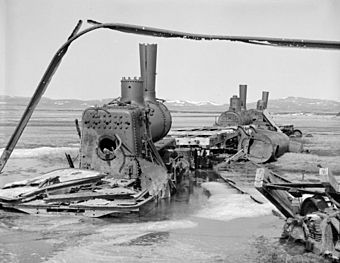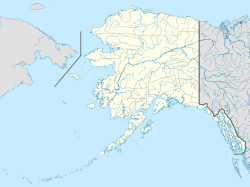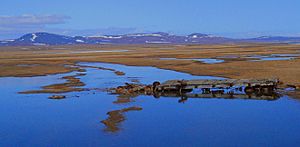Council City and Solomon River Railroad facts for kids
Quick facts for kids |
|
|
Council City and Solomon River Railroad
|
|

Rusting locomotives of the Council City and Solomon River Railroad, 1981.
|
|
| Location | Mile 31 of Nome-Council Highway |
|---|---|
| Nearest city | Nome, Alaska |
| Area | less than one acre |
| Built | 1903 |
| NRHP reference No. | 01000109 |
| Added to NRHP | March 2, 2001 |
The Council City and Solomon River Railroad was an old railway line in Alaska. It was named after the Solomon River and the city of Council. This railroad helped connect important gold mining areas. It ran for a short time, from 1903 to 1907.
Today, you can still see parts of this old railroad. At Mile 31 of the Nome-Council Highway, there are three old train engines, two flat cars, and a boiler. These remains are now a special historic site. They were added to the National Register of Historic Places in 2001.
Contents
Building the Alaska Railroad
A company called the Western Alaska Construction Co. built this railroad. It was started in 1903. The company's main goal was to build the Council City & Solomon River Railroad. They also planned to add more railway lines later. Most of the people who owned the company were businessmen from Chicago.
The company's leaders were:
- John R. Bowman, who was the president
- J. Warren Dickson, who was the vice-president and general manager
- William F. Krohmer, who was the treasurer
- Jacob A. Freund, who was the secretary
These people and others helped fund the railroad project.
Why the Railroad Was Important
The railroad was one of the big projects started in 1903. About 9 miles (14 km) of track were laid in the first year. The company believed that the mouth of the Solomon River was a great starting point. It had a safe harbor for loading and unloading goods. This was important because of the weather in Alaska.
The plan was to build the railroad north and west. It would go into the most important gold fields in Alaska. These were the Cape Nome fields. The railway started in Solomon City. It followed the Solomon River, passing many mining camps. Its first stop was Council City.
Connecting Gold Rush Towns
Council City was a major place for distributing supplies. It served the Upper Niukluk basin. The distance from Solomon City to Council City was about 50 miles (80 km). The company planned to connect all the main mining areas. This included places like Grantley Harbor, Port Clarence, Good Hope Bay, and Nome. The idea was to create a network of railways across the Seward Peninsula.
Building the railroad was expensive. It cost about $8,000 to $12,000 for each mile of track. The company hired official U.S. government surveyors. Paul Heinze was the chief engineer. Hermann Heinze was his assistant.
Land for the Railway
The company received rights to use land for the railway. They had 100 feet (30 meters) on each side of the tracks. They also got 40 acres (16 hectares) for train stations at each end of the line. For every 10 miles (16 km) of track, they received another 20 acres (8 hectares) for stations. In total, this added up to 13,000 acres (5,300 hectares) of land.
The official route started near the mouth of the Solomon River. It went to a spot near Council City. The company also filed maps for other planned lines. One was from Nome City to Wheeler, about 20 miles (32 km). Another was from Norton Sound up the Solomon River for 20 miles (32 km).



